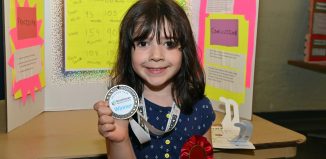D. None of the Above: In a well-received commencement speech, Dr. Fauci reviews lessons learned
By Daniel Dunaief

Speaking in a front of a receptive, appreciative and celebratory audience of 125 graduates of the Renaissance School of Medicine at Stony Brook University who gave him a standing ovation before and after his commencement address, Dr Anthony Fauci, former Director of the National Institute of Allergy and Infectious Diseases, shared some thoughts on the hard lessons learned from the last four years.
Dr. Fauci currently serves as Distinguished University Professor at the Georgetown University School of Medicine and the McCourt School of Public Policy and also serves as Distinguished Senior Scholar at the O’Neill Institute for National and Global Health Law.
“I speak not only of lessons we have learned that can help us prepare for the next public health challenge, but, more importantly, of lessons that will apply to your future professional and personal experiences that are far removed from pandemic outbreaks,” Fauci said, after complimenting the class on persevering in their training despite the challenges and losses.
To start with, he suggested these new doctors expect the unexpected. In the early phase of the pandemic, the virus revealed multiple secrets, “some of which caught us somewhat by surprise,” Fauci said. “As well prepared as we thought we were, we learned that SARS-Cov2 is often transmitted from people who are infected but have no symptoms.”
Additionally, the virus continually mutated, forming more transmissable variants that caused illness even in those who had already contracted the virus.
“Each revelation not only humbled us, but served as a stark reminder that, when facing novel and unanticipated challenges in life, as you all will I promise, any predictions we might make about what will happen next or how the situation will unfold must always be provisional,” Fauci said.
Dealing with these challenges requires being open-minded and flexible in assessing situations as new information emerges.
He cautioned the new doctors and scientists to beware of the insidious nature of anti science.
Even as doctors have used data and evidence learning to gain new insights and as the stepping stones of science, anti science became “louder and more entrenched over time. This phenomenon is deeply disturbing” as it undermines evidence-based medicine and sends the foundation of the social order down a slippery slope.
Even as science was under attack, so, too, were scientists. “During the past four years, we have witnessed an alarming increase in the mischaracterization, distortion and even vilification of solid evidence-based findings and even of scientists themselves,” Fauci continued.
Mixing with these anti science notions were conspiracy theories, which created public confusion and eroded trust in evidence-based public health principals.
“This became crystal clear as we fought to overcome false rumors about the mRNA Covid vaccines during the roll out” of vaccines which Dr. Peter Igarashi, Dean of the Renaissance School of Medicine estimated in his introduction for Dr. Fauci saved more than 20 million lives in their first year of availability.
“I can confirm today that Bill Gates [the former CEO of Microsoft] and I did not put chips in the Covid vaccines,” Fauci said. “And, no, Covid vaccines are not responsible for more deaths than Covid.”
The worldwide disparagement of scientific evidence is threatening other aspects of public health, he said, as parents are opting out of immunizing their children, which is leading to the recent clusters of measles cases, he added.
Elements of society are “driven by a cacophony of falsehoods, lies and conspiracy theories that get repeated often enough that after a while, they become unchallenged,” he said. That leads to what he described as a “normalization of untruths.”
Fauci sees this happening on a daily basis, propagated by information platforms, social media and enterprises passing themselves off as news organizations. With doctors entering a field in which evidence and data-driven conclusions inform their decisions, they need to “push back on these distortions of truth and reality.”
He appealed to the graduates to accept a collective responsibility not to accept the normalization of untruths passively, which enables propaganda and the core principals of a just social order to begin to erode.
Fauci exhorted students to “seek and listen to opinions that differ from your own” and to analyze information which they have learned to do in medical school.
“Our collective future truly is in your hands,” Fauci said.
Fauci also urged these doctors and scientists to take care of their patients and to advance knowledge for the “good of humankind.”







